
November 5, 2024
San Francisco Voter Guide & Endorsements
An important note about our voter guide…
This November, conservatives and independents like you will go to the polls and be the difference between more of the same in San Francisco and a new era of #Opportunity4Everyone. But with dozens of candidates, 10 statewide propositions, and 15 local propositions on the ballot, it can be more than just a bit overwhelming. Complicating matters further is that a number of local races are decided by ranked choice voting, allowing you to vote for more than one candidate. If you are not familiar with how ranked choice voting works, STOP and watch this video before continuing.
In ranked choice voting elections, it is absolutely critical that, in any given race, you rank every single candidate that you believe would be better — even marginally — than any unranked candidates. You must not “bullet-vote” and rank only your single favorite candidate.
Why not? What happens when people bullet-vote? In 2019, nearly a thousand Republicans voted for Ryan Lam, the only GOP candidate in the race for District 5 Supervisor. When Lam was eliminated from contention, hundreds of ballots cast for Lam were “exhausted” — meaning that the voters who filled out those ballots bullet-voted and did not rank a second-choice candidate. Therefore, with Lam gone, voters who filled out those ballots had no say in what happened next. Still in the race were Vallie Brown, a Democrat, and Dean Preston, a member of the Democratic Socialists of America. Brown was not a good candidate, having emerged from the same political machine that created London Breed — but she was a much better candidate than Preston, who advocates for defunding the police and blames San Francisco’s homelessness crisis on “capitalism.” Unfortunately, Preston won that race by 185 votes, meaning that if only 186 more Republicans had bothered to rank Brown as their second choice, San Francisco would not have had a socialist on its Board of Supervisors for the last five years, undermining our city’s economic recovery, denying our neighbors their fundamental right to public safety, and advocating for policies that have resulted in thousands of overdose deaths. Brown may have been bad. Preston was much, much worse.
Our voter guide was designed with scenarios like this in mind. What happened in the Lam/Brown/Preston race was not an isolated incident. It happened in the District Attorney race that year, too, resulting in the election of Chesa Boudin. We can’t risk something like that again.
So, how did we decide on the rankings in our voter guide? Our rankings were informed by multiple factors: how closely aligned is the candidate with our principles, how well do we expect the candidate to perform in the particular office they’re seeking, how willing is the candidate to engage with conservatives in San Francisco, how serious a campaign is the candidate running, and how much will our endorsement help the candidate versus others in the race. If a candidate didn’t meet baseline requirements across these criteria, they were ineligible for our endorsement. Nevertheless, in some cases we did rank — but not endorse — such candidates, given the alternatives were much worse.
Download a printable version of our voter guide here.
Candidate Rankings
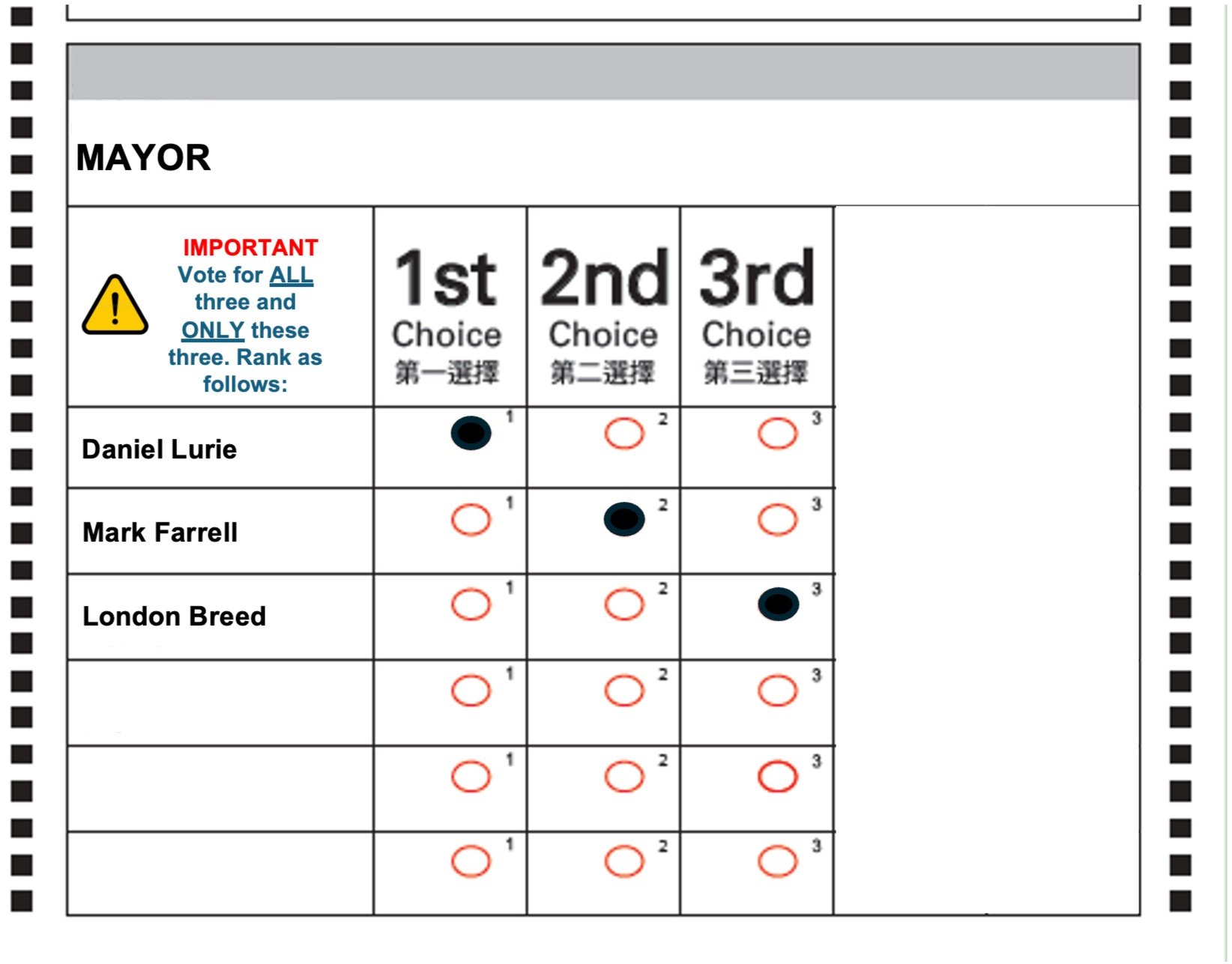

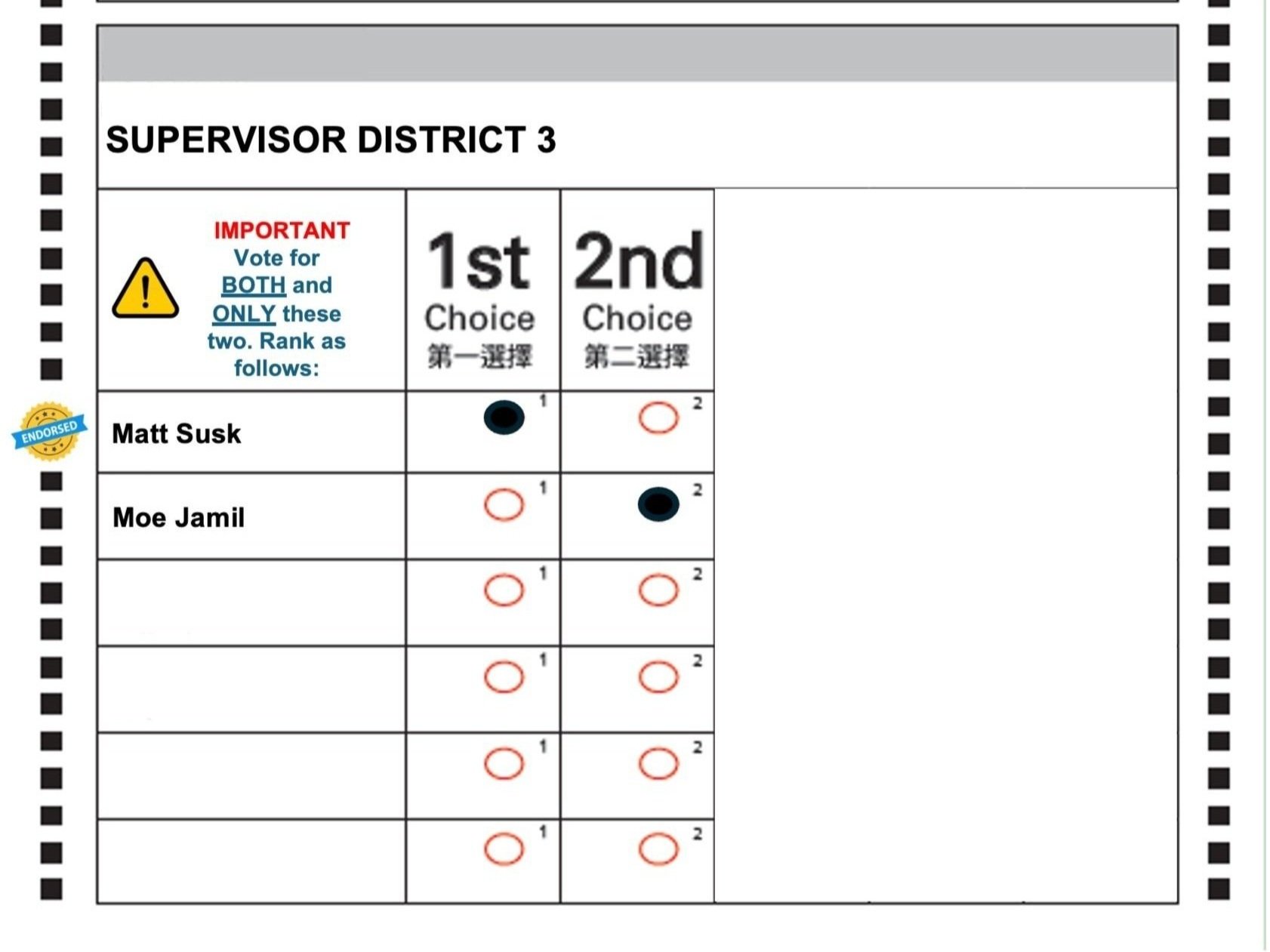


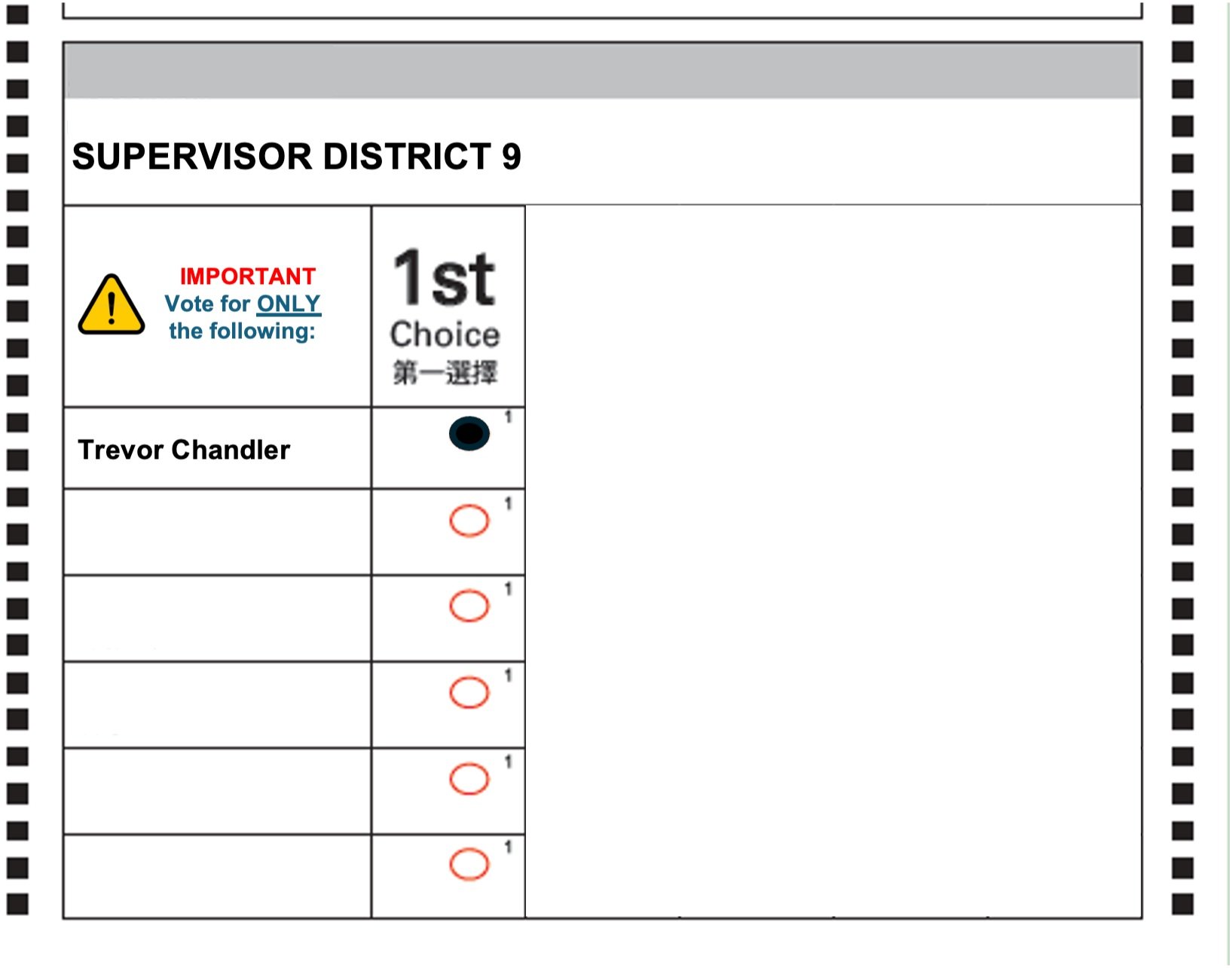
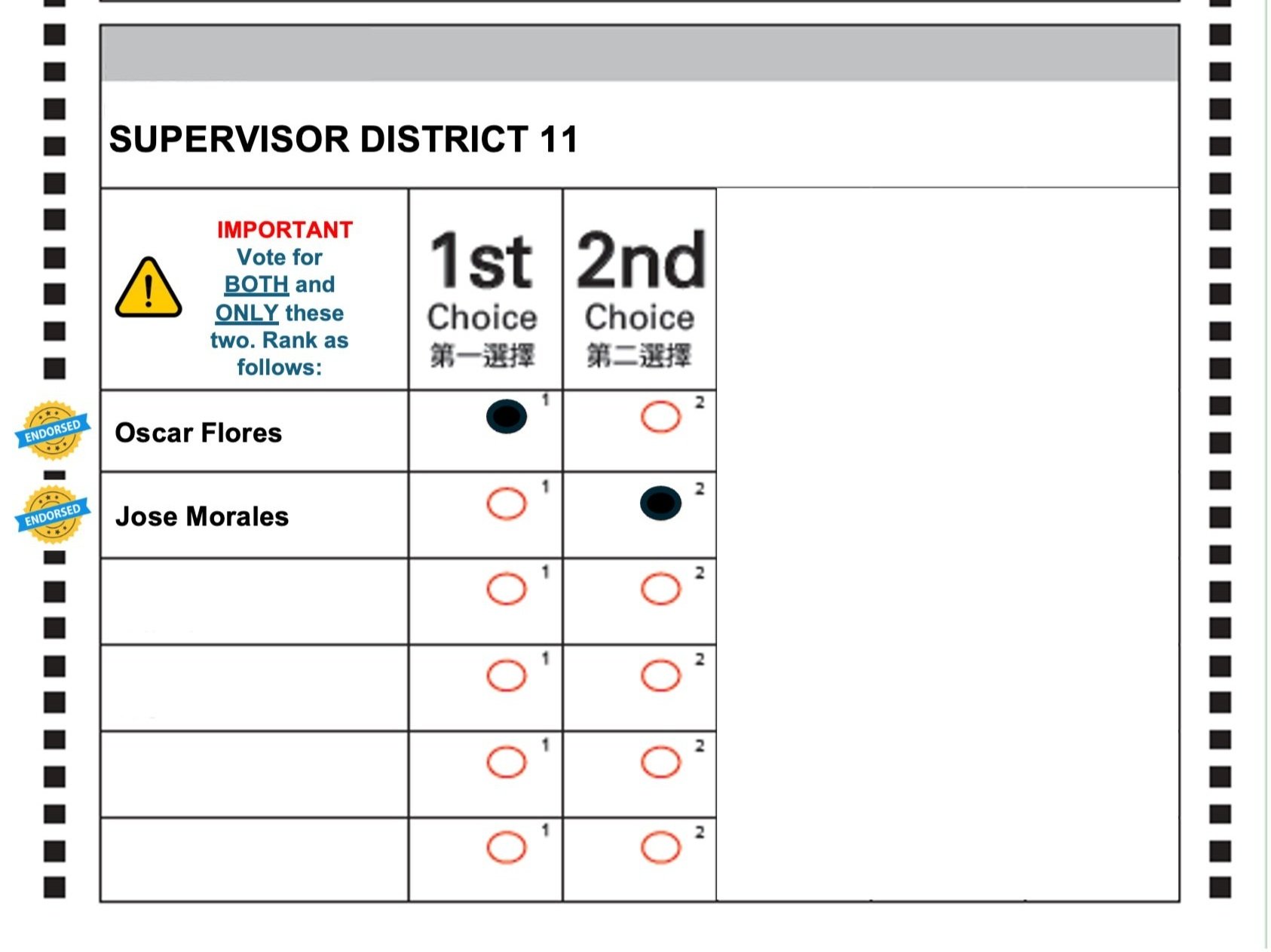

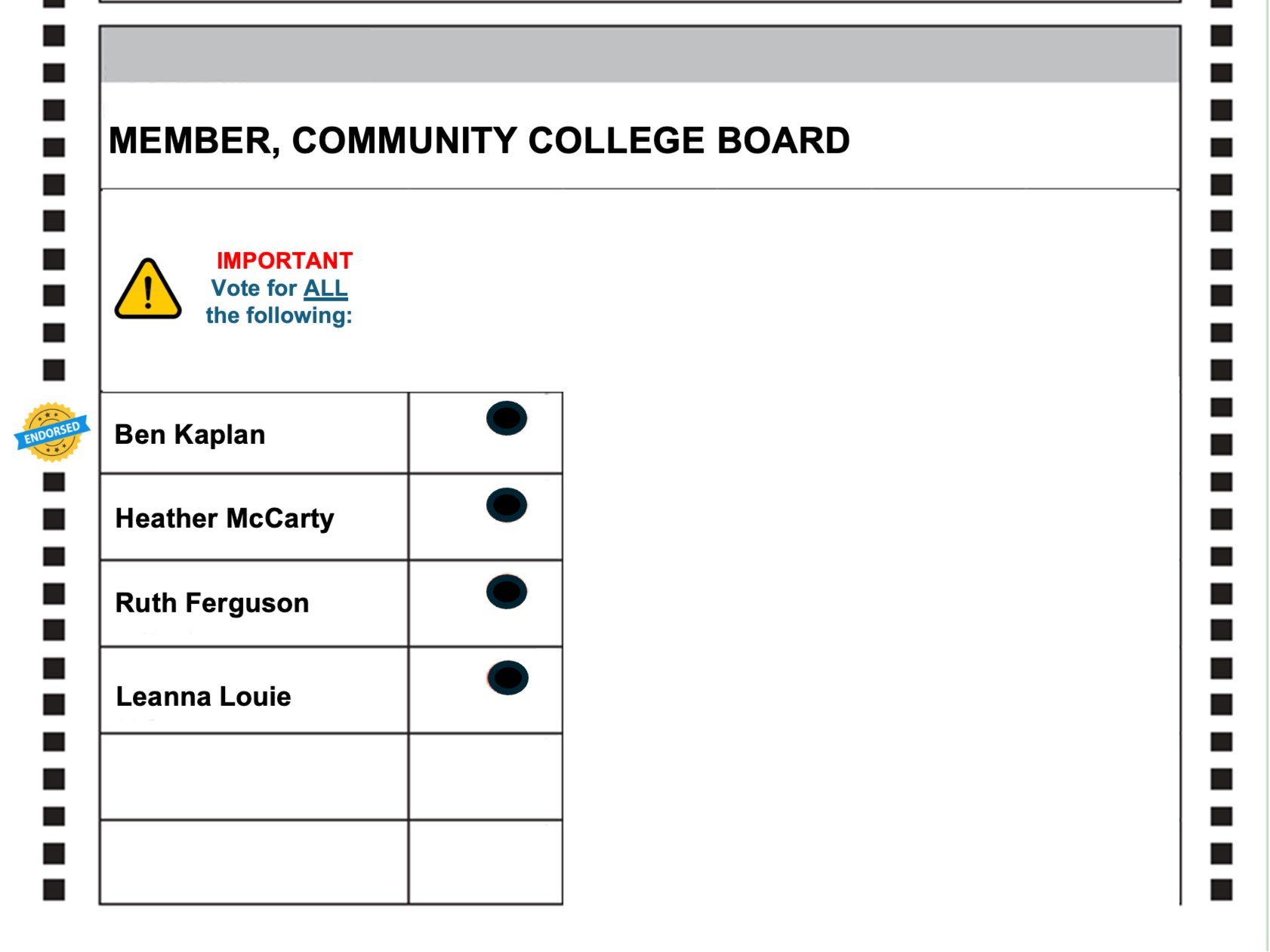
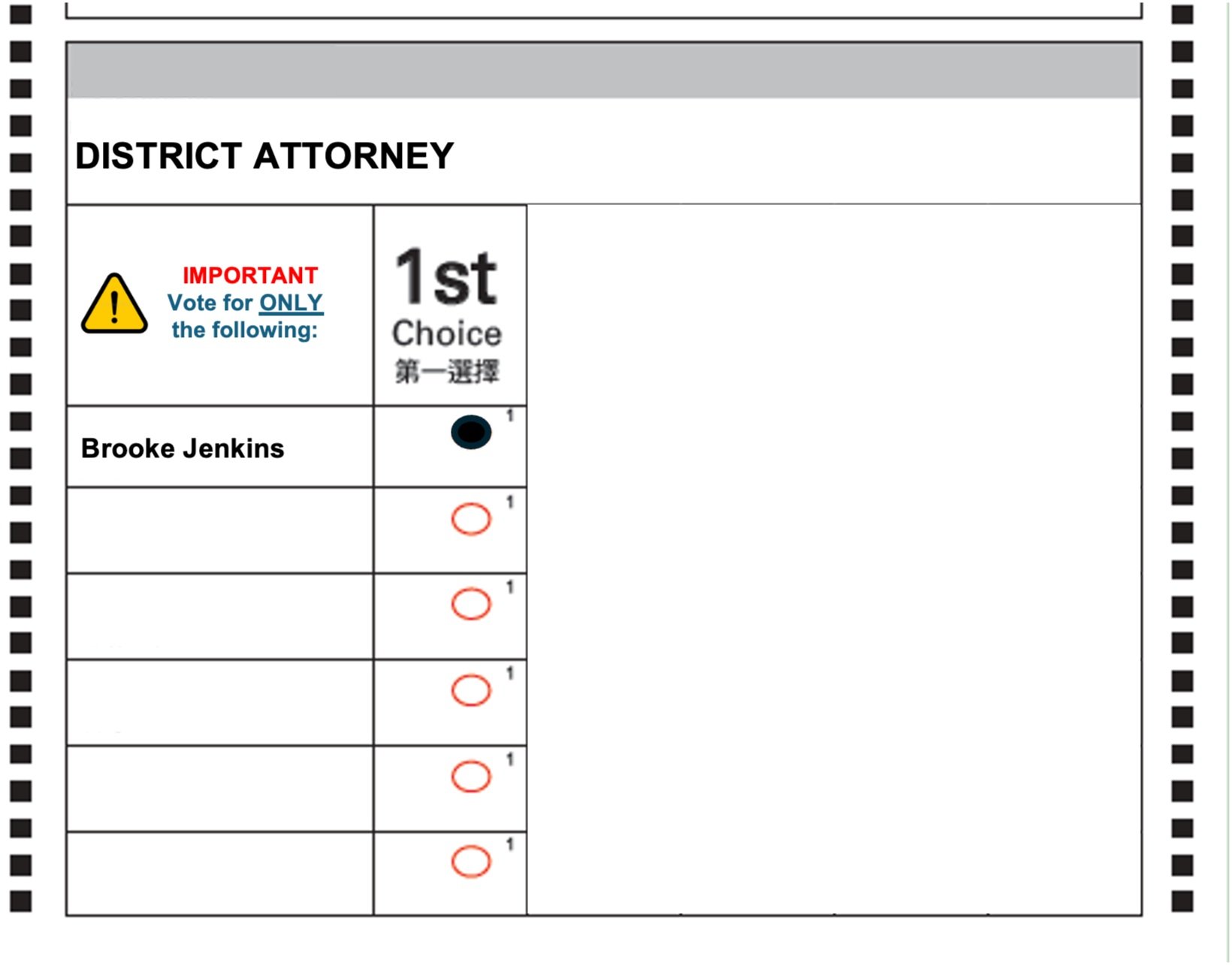

Non RCV/Multi-Seat Races
US Congress — District 11: Bruce Lou (ENDORSED)
State Senate — District 11: Yvette Corkrean (ENDORSED)
State Assembly — District 17: Manuel Noris-Barrera (ENDORSED)
State Assembly — District 19: Catherine Stefani
BART Board — District 7: Dana Lang
BART Board — District 9: Joe Sangirardi
Ballot Measures
-
SFUSD already spends more than $23,000 per student annually – amongst the top 15 percent of unified school districts in California, almost $10,000 more than the US average, and more than two times the average in OECD countries. Yet only half of SFUSD's K-3 students read at grade level, and less than half meet grade-level expectations in math. The numbers are even more dismal for African American, Latino, and Pacific Islander students. Where is all the money going?
SFUSD is facing a nearly half-billion dollar budget deficit. It’s tempting to say, then, “Let’s just help bridge the gap.” But we already did that back in 2016, when voters approved a similarly-sized school bond measure. SFUSD doesn’t have a revenue problem, it has a fiscal management problem.
-
San Francisco, a city of fewer than 800 thousand residents, has an annual budget of more than $15 billion dollars. We spend 40 percent more per capita than peer consolidated city-counties – even after adjusting for our high cost of living. In exchange for their generosity, taxpayers have seen multiple government officials indicted for corruption, steadily declining municipal services, and San Francisco crowned, by one ranking, as the “worst run city in America.”
Building and maintaining public infrastructure is an essential function of government, but Proposition B reflects the same approach that has failed us time and again: throw money at a problem, with hardly any real oversight, and cross our fingers that the special interests who scoop it up will save the day.
-
All of the powers afforded to the Inspector General under this proposition already exist within San Francisco government. The Controller’s Office includes a City Services Auditor responsible for performance, financial, and compliance auditing of public service offerings, infrastructure, contractors, and community based organizations. The Board of Supervisors can issue subpoenas, the District Attorney can pursue criminal indictments, the City Attorney can file civil suits, and the Ethics Commission, Civil Grand Jury, and the more than 100 other commissions and committees possess oversight powers, as well.
Each of these bodies and offices has failed to meaningfully reduce corruption because they either have other priorities or, worse, they are not independent. Proposition C replicates this fatal flaw, mandating that the Inspector General’s appointment be approved by the Mayor and the Board of Supervisors – the very same officials whose performance should be at the top of any list of targets in San Francisco ripe for a real audit. This conflict of interest would and should undermine any trust voters might have in the Inspector General, who is liable to become a mere political attack dog for whichever faction holds momentary sway at City Hall.
Read our alternative proposal here.
-
One of San Francisco's biggest problems is that no one is really in charge. In many ways, our city is run by a massive network of more than 100 commissions and committees. The results are (a) corruption, because to get anything done you have to get approval from multiple government bodies with no oversight; (b) waste, because few of these commissions actually do anything, but they all have staff that gets paid; and (c) confusion amongst voters, because they don’t know who to blame when something goes wrong.
Proposition D starts to fix this problem by cutting the number of commissions and transferring much of their power back to the mayor — so voters have one person to hold accountable. Additionally, it would reform the Police Commission so that it adheres to the limits imposed on it under the City Charter and focuses on oversight and accountability, not policymaking.
-
Alas, people play dirty in San Francisco politics. Rather than argue against Proposition D on the merits, its opponents put Proposition E on the ballot intentionally to confuse voters. The two propositions appear similar, but Proposition E actually increases the number of commissions by creating a new commission to “study” cuts to other bodies.
-
SFPD is woefully understaffed. Officially, we have around 1,600 sworn officers on our police force. In reality, many of these officers are assigned to special duty at the airport or the mayor’s protection detail, and many are on medical or other leave.
According to a study commissioned by the City, we need at least 2,000 officers to provide an adequate level of public safety to residents. That number is closer to 2,700 if we want the same number of police per capita as in cities in Western Europe or East Asia, where you can walk down the street any time of day or night and feel safe because there are so many cops out, visibly on patrol.
Proposition F is not going to grow SFPD, but it’s going to stop the attrition we've seen over the past few years by introducing a deferred retirement option for currently serving officers.
-
Another profligate spending measure. See our argument against Proposition B, above.
-
Another profligate spending measure. See our argument against Proposition B, above.
-
Another profligate spending measure. See our argument against Proposition B, above.
-
Another profligate spending measure. See our argument against Proposition B, above.
-
Proposition K is a solution in search of a problem. A compromise solution on the contentious issue of closing the Great Highway to cars is currently in place whereby the road is pedestrian- and cyclist-only on weekends and holidays.
Proposition K was put on the ballot with hardly any constituent input to upset this compromise, closing the Great Highway to cars year-round. But there are already pedestrian and cyclist paths next to the highway, not to mention the beach. Furthermore, Proposition K is being sold to voters as a measure to open a park in place of the road, yet in reality there is no funding nor are there any plans for a park.
Altogether, this proposition strikes us as a betrayal of the "share the road" values that bicycle advocates regularly espouse.
-
Muni leadership would like you to believe that its failures with respect to cleanliness, safety, and on-time performance are due to lack of funding. But the opposite is true. Revenue has declined because ridership has, in large part because Muni provides terrible service.
San Franciscans are voting with their wallet, looking to rideshare and autonomous vehicle companies for a better transportation experience. Dismayed at this exercise of consumer choice, transit ideologues put this measure on the ballot to force you to pay Muni a tax (re: ransom) every time you take an Uber, Lyft, or Waymo -- subsidizing a service that you don't use or want, and that squanders millions of tax dollars per year.
-
This is a sensible proposition that would correct the most egregious tax structure errors in 2018's Measure C. Read more here.
-
This proposition is unlikely to increase the number of first-responder applicants, but it has the potential to improve the quality of the applicant pool at a comparatively low cost. Read more here.
-
Read our statement in the wake of the Supreme Court's Dobbs decision.
-
California voters rejected a similar $15 billion dollar bond in 2020 and we believe voters should reject this iteration, too.
Our state is running a deficit and interest rates are high, which will increase borrowing costs. This bond would also require local governments to borrow funds to receive matching grants from the state.
Even if passed, Proposition 2 fails to ensure lower income districts receive adequate funding, because they face greater challenges in raising matching funds.
-
We stand with our brothers and sisters in the Log Cabin Republicans in support of this proposition.
-
Read more here.
-
Under the California Constitution, localities can’t issue bonds without 2/3 voter approval. This proposition would lower that threshold to 55 percent for housing and infrastructure projects.
California’s government doesn’t need more money to build housing and infrastructure; it needs to address the regulatory capture factors that drive up housing and infrastructure development costs in the state. -
Requiring prisoners to work in order to provide restitution to the communities they've victimized, and to mitigate the costs of incarcerating them, is a good and just thing and we should not prohibit it.
-
Proposition 32 would increase California’s minimum wage beyond the current $15 per hour, with planned annual increments of $1 until it reaches $18 per hour. After reaching $18, the minimum wage would adjust annually for inflation.
Voters should reject Proposition 32 because it will exacerbate economic pressures on businesses and may accelerate the displacement of human workers by AI and robot technologies. By mandating higher wages, this measure forces businesses to either pass higher labor costs onto consumers or seek automation solutions to maintain profitability, thereby hurting the very individuals the proposition aims to help.
-
Rent control depresses the housing supply, increasing the cost of housing for the vast majority of tenants who were not lucky enough to have moved into rent-controlled homes decades ago when rents were low.
-
The LA-based AIDS Healthcare Foundation (AHF) was founded in 1987 and, within a decade, became the largest AIDS healthcare nonprofit in the country. AHF, and it’s leader, Michael Weinstein, have been sued and investigated by multiple Attorneys General over various kickback schemes and other corrupt activities. Furthermore, AHF has dumped hundreds of millions of dollars into anti-housing, progressive ballot initiatives by exploiting a loophole in a federal Medi-Cal reimbursement program. This proposition would target bad actors like AHF, labeling them “Prescription Drug Price Manipulators” and forcing them to spend all their federal reimbursement money on actual patient care.
-
-
Ten years ago, California voters passed the deceptively titled “Safe Neighborhoods and Schools Act” — Proposition 47. Spoiler alert: Proposition 47 made our neighborhoods and schools less safe.
It did so by essentially decriminalizing drug possession and shoplifting in California — reducing those offenses from potential felonies to misdemeanors. The results speak for themselves. It took the Democrats a decade years to figure out that this was a bad idea, but they’ve finally thrown their support behind a measure that Republicans have been pushing for a long time, which is Proposition 36.
Proposition 36 rolls back the worst parts of Prop 47, re-instituting felony charges for some of the foregoing offense. It’s not perfect, but it’s a great start.
